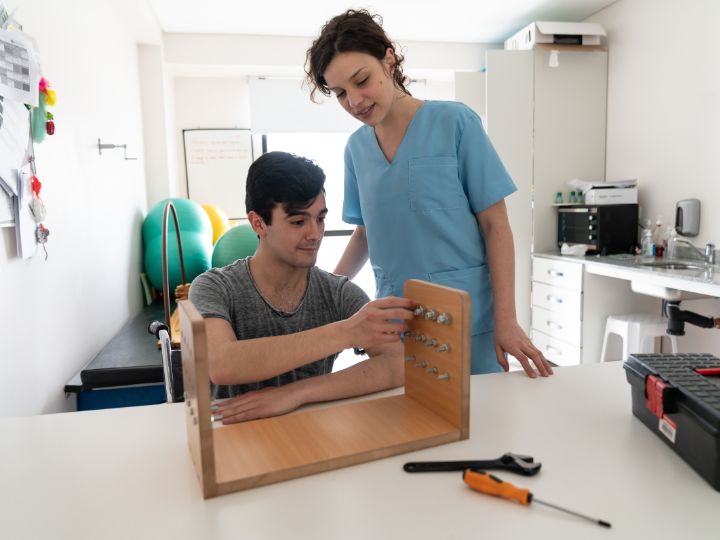When most people think of occupational therapy, they often picture exercises and stretches. While physical rehabilitation is certainly part of the picture, occupational therapy encompasses far more than movement. These skilled healthcare professionals are experts in helping people navigate the practical challenges of daily life, teaching essential skills that go well beyond traditional exercise routines.
Understanding the Holistic Approach of Occupational Therapy
Occupational therapists take a comprehensive view of human function, considering not just physical capabilities but also cognitive, emotional, and social factors that impact daily living. Their goal is to help individuals achieve independence and quality of life through meaningful activities and roles. The term “occupation” in occupational therapy refers to all the activities that occupy our time and give meaning to our lives—from basic self-care to complex work tasks, from household management to leisure pursuits. When injury, illness, or disability disrupts these activities, occupational therapists step in to bridge the gap between limitation and participation.Essential Life Skills Taught by Occupational Therapists
1. Activities of Daily Living (ADLs)
One of the primary focuses of occupational therapy is helping individuals master or relearn activities of daily living. These fundamental skills include:- Personal hygiene and grooming: Teaching adaptive techniques for bathing, teeth brushing, and hair care when mobility or strength is limited
- Dressing strategies: Demonstrating one-handed dressing techniques, recommending adaptive clothing, or teaching energy conservation methods
- Eating and meal preparation: Providing adaptive utensils, teaching safe kitchen navigation, and developing strategies for independent meal preparation
- Toileting and continence management: Recommending bathroom modifications and teaching transfer techniques for safety and dignity
2. Cognitive and Executive Function Skills
Occupational therapists address cognitive challenges that can impact daily life, particularly after stroke, traumatic brain injury, or with conditions like dementia. They teach:- Memory strategies: Using calendars, smartphones, and organizational systems to compensate for memory difficulties
- Problem-solving techniques: Breaking down complex tasks into manageable steps
- Attention and concentration exercises: Developing strategies to minimize distractions and improve focus
- Time management skills: Creating routines and using visual schedules to structure daily activities
3. Fine Motor Skills and Hand Function
Beyond gross motor movements, occupational therapists specialize in improving fine motor control essential for daily tasks:- Writing and keyboarding adaptations: Teaching proper ergonomics and recommending adaptive tools
- Buttoning, zipping, and fastening techniques: Providing button hooks, zipper pulls, and other adaptive devices
- Precision tasks: Improving coordination for activities like using smartphones, handling money, or managing medications
4. Home Safety and Environmental Modifications
Occupational therapists are experts in assessing home environments and recommending modifications to promote safety and independence:- Fall prevention strategies: Identifying and addressing environmental hazards
- Adaptive equipment recommendations: Suggesting grab bars, raised toilet seats, shower chairs, and other safety devices
- Workspace ergonomics: Setting up home offices or workstations to prevent injury and maximize function
- Lighting and contrast adjustments: Improving visibility for those with visual impairments
5. Sensory Processing and Integration
For individuals with sensory processing challenges, occupational therapists provide strategies to manage sensory input:- Creating sensory diets: Developing personalized plans for sensory input throughout the day
- Environmental modifications: Adjusting lighting, sounds, and textures to support comfort and function
- Coping strategies: Teaching techniques to manage sensory overload or under-responsiveness
6. Social Skills and Community Integration
Occupational therapy extends beyond the home to help individuals participate fully in their communities:- Social interaction skills: Teaching appropriate social behaviors and communication strategies
- Community navigation: Practicing skills needed for shopping, banking, and accessing community services
- Work readiness: Developing skills necessary for employment or volunteer positions
- Leisure participation: Identifying and adapting recreational activities to match abilities and interests
7. Pain Management and Energy Conservation
For those dealing with chronic conditions, occupational therapists teach valuable techniques:- Joint protection strategies: Demonstrating ways to perform tasks that minimize stress on painful joints
- Pacing techniques: Teaching how to balance activity and rest to manage fatigue
- Body mechanics: Showing proper postures and movements for daily activities
- Relaxation techniques: Introducing breathing exercises and mindfulness practices
8. Adaptive Technology Training
In our digital age, occupational therapists help individuals master technology that enhances independence:- Smartphone and tablet accessibility features: Teaching voice commands, text-to-speech, and other adaptive features
- Computer modifications: Setting up voice recognition software or alternative input devices
- Smart home technology: Integrating devices that allow control of lights, thermostats, and appliances
- Communication aids: Training in the use of augmentative and alternative communication devices
The Personalized Approach to Life Skills Training
What makes occupational therapy particularly effective is its individualized approach. Therapists don’t apply one-size-fits-all solutions; instead, they consider each person’s unique circumstances, goals, and challenges. They take into account factors such as:- Personal interests and values
- Cultural background and beliefs
- Family dynamics and support systems
- Living environment and community resources
- Work or school requirements
- Future goals and aspirations
The Collaborative Nature of Occupational Therapy
Occupational therapists work as part of a comprehensive healthcare team, collaborating with physicians, physical therapists, speech therapists, social workers, and other professionals. This interdisciplinary approach ensures that all aspects of a person’s recovery and adaptation are addressed cohesively. Family members and caregivers are also integral to the therapeutic process. Occupational therapists provide education and training to support systems, ensuring that newly learned skills can be reinforced and maintained in the home environment.Long-Term Impact of Life Skills Training
The life skills taught by occupational therapists have far-reaching effects beyond immediate functional improvements. By promoting independence and self-sufficiency, these interventions can:- Reduce caregiver burden
- Decrease healthcare costs
- Improve quality of life
- Enhance self-esteem and confidence
- Facilitate community participation
- Support aging in place
- Enable return to work or school


